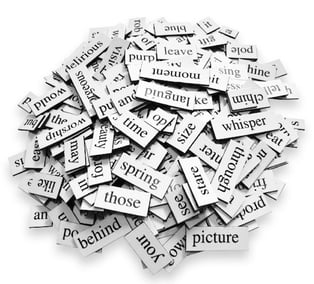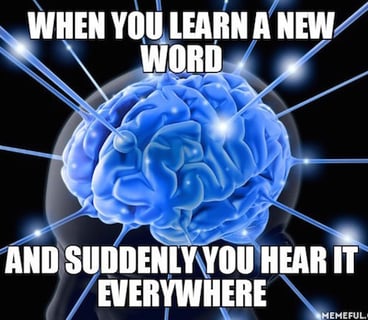Vocabulary Words on the SAT Exam

These skills will carry you forward in both your academic and professional careers.
That’s why there is a vocabulary section on the SAT exam. It’s important to learn these life skills.
100 Most Common SAT Word List
Here is a list of the most common SAT words that are often tested on the SAT vocabulary exam.
- Abandon – give up completely
- Abate – become less intense or widespread
- Abet – encourage or assist
- Accede – accent or agree to a demand
- Berate – scold or criticize
- Bovine – of or relating to cattle
- Braggart – a person who boasts about achievements
- Burnish – polish by rubbing
- Cache – a collection of similar items stored in a secret place
- Cacophony – harsh discordant mixture of sounds
- Catalyst – substance the increases the rate of chemical reaction
- Censorious – severely critical of others
- Dearth – scarcity or lack of something
- Demagogue – a political leader who seeks support by appealing to popular desires rather than reason
- Diluvial – of or relating to a flood
- Dispassionate – not influenced by strong emotion
- Effluvia – an unpleasant or harmful odor
- Emulate – match or surpass
- Epochal – extremely significant
- Expound – explain or present
- Facile – appearing comprehensive by ignoring the complexities of the situation
- Fictive – created by imagination
- Flippant – not showing serious attitude
- Gauche – lacking grace
- Gregarious – outgoing or social
- Grotto – small cave or cave-like structure
- Hedonist – person who believes the pursuit of pleasure is the most important aspect of life
- Heretical – practicing religious heresy
- Hubris – excessive pride
- Hypocrite – a person who says one thing and does another
- Ignoble – not honorable in character
- Imbibe – drink alcohol
- Imperious – assuming power without justification
- Importunate – persistant
- Jettison – throw or drop for an airplane or ship
- Jocular – humorous or playful
- Junta – military group that rules after taking by force
- Kismet – destiny
- Lexicon – vocabulary of a person
- Licentious – immoral
- Limber – flexible
- Loquacious – talkative
- Malapropism – mistaken use of a word in place of a similar sounding word
- Malfeasance – wrongdoing
- Mawkish – sentimental in a sickening way
- Misnomer – wrong or inaccurate name in designation
- Modicum – small or minimal portion
- Mote – tiny piece of a substance
- Necromancy – practice of communicating with the dead
- Nihilism – rejection of religion
- Nomenclature – the choosing of names for things
- Novel – fictitious prose narrative
- Obfuscate – to confuse
- Olfactory – of or relating to the sense of smell
- Opprobrious – compressing scorn
- Ostracize – exclude from a society or group
- Palatial – resembling a palace
- Pandemic – disease prevalent over an entire country or multiple countries
- Paramount – more important than anything else
- Patrician – an aristocrat
- Polyglot – knowing or using several languages
- Prestidigitation – magic tricks performed for entertainment
- Provincial – of or concerning a province or country
- Rancor – bitterness or resentfulness
- Rarefy – to make or become more dense or solid
- recapitulate – summarize and state again the main points
- Refute – prove to be wrong or false
- Repose – a state of rest
- Resilient – able to withstand
- Revile – criticize in an abusive manner
- Rife – of common occurrence
- Sanctimonious – making a show of being morally superior
- Scrupulous – diligent attention to details
- Sedition – conduct or speech inciting people to rebel
- Sinecure – position requiring little or no work
- Stint – supply inadequate amount of something
- Sybarite – self indulgent person
- Tawdry – showy but cheap
- Tenacious – keep a firm hold on something
- Terse – sparing in use of words
- Tout – attempt to sell something by aggressively pestering
- Trounce – defeat heavily in a contest
- Tutelage – authority over someone or something
- Unconscionable – not right or reasonable
- Untoward – unexpected
- Usury – lending money at unlawful rates
- Vehemently – showing strong feeling
- Veritable – using as an intensifier
- Vilify – write or speak in an abusively disparaging way
- Vociferous – vehement
- Wan – pale with appearance of illness
- Wield – hold and use typically a weapon or tool
- Winsome – attractive appearance or character
- Wry – using dry or mocking humor
- Xenophobe – fear or dislike for people of different countries
- Yeoman – a man holding and cultivating a field
- Yen – Japanese monetary unit
- Yowl – loud waining cry
- Zenith – peak
- Zephyr – soft gentle breeze

How do you learn new words, especially big ones like «obstreperous» and «percipient» that you don’t often hear in daily conversation? Do you pore over long lists, make flash cards, or focus on one or two at a time?
For those playing the long game, SAT Word of the Day sites and email lists can be useful resources for gradually building your vocabulary over time. This guide will point you to the best sources of SAT Word of the Day and give you some strategies for how to use them effectively. First, why might you want to study vocabulary this way?
Is SAT Word of the Day Effective?
Using SAT Word of the Day to build your vocabulary is effective in a gradual way, but I wouldn’t necessarily recommend it as the only vocab studying you do to prepare for the SAT. It’s a good way to start early, learn new words, and insert a little bit of SAT prep into your routine on a daily basis. That being said, SAT Word of the Day probably doesn’t substitute for more extensive studying. Let’s take a look at the pros and cons for studying SAT words in this way.
Pros of SAT Word of the Day
Like a trickle of water filling up a bowl, learning a word a day can build up to a great deal of knowledge if you sustain it over time. It’s a low-pressure, stress-free way to start SAT prep early, rather than cramming a lot of words at once and struggling to retain them. You could start freshman year and spend just 5 minutes a day learning a word’s definition and how that word is used in different contexts.
Have you ever noticed how you learn a new word or fun fact for the first time and suddenly start seeing it everywhere? This «Baeder-Meinhof Phenomenon» could happen with new SAT words, too. You’ll start to notice (and should be on the lookout for) SAT words when you’re reading books, blogs, or the news. This will both aid your long-term retention of the vocab and help you understand if a given word has various uses and connotations. Widening your vocabulary is not just useful for the SAT, but also for your own writing, reading, and work throughout high school and college.
Finally, SAT Word of the Day also serves as a daily reminder to stick to your overall test prep schedule. Incorporating a word a day or an SAT Question of the Day orients you towards learning and building your skills and understanding on a daily basis. While SAT Word of the Day is useful for building up your vocabulary and retaining new words over time, what are some downsides to this approach to studying?
Cons of SAT Word of the Day
Perhaps the most obvious question about using SAT Word of the Day is whether it teaches you enough to really be effective. Since you’re only focusing on one word each day, you’d have to start a long time in advance of your SAT test to learn enough words. If you don’t keep reviewing and referring back to words, you might forget those you learned several months or a year ago. While you’re studying a word a day in theory, likely you would end up studying more to review ones that you’ve already learned.
Another downside to SAT Word of the Day is that it could be more of a passive than an active approach. You’re learning a word, but not necessarily putting it in context of the SAT and applying it to real SAT questions. Thus you would want to be proactive and couple your studying with answering sample questions and ensuring that you can demonstrate what you’ve learned on SAT passage-based and sentence completion questions.
How effective studying with SAT Word of the Day is also varies from student to student and depends on their individual learning style and focus. This approach may appeal more to you if you like spreading out your test prep over a sustained period of time, but may not be your preferred mode if you like to bunch up studying and focus intensively on more material at the same time.
In order to get the most use out of SAT Word of the Day, you want to use high quality resources, just as you should with the rest of your SAT prep. Read on for my suggestions of the best sources for SAT Word of the Day.
Where Can You Find SAT Words of the Day?
You can track down high quality SAT Words of the Day on various websites, as well as sign up for daily emails. For further reinforcement, you could also choose to create your own word of the day flashcards by writing down vocabulary, definitions, and examples from SAT vocabulary lists. Below are my suggestions for the best websites and email lists.
New York Times SAT Vocabulary
The New York Times learning blog has an SAT Word the Day 7 days a week. It gives you SAT words and definitions, as well as an example of how each word is used in a sentence. What I like about this blog is that it links you to all the New York Times articles that have used that word. This lets you gain a sense of how it’s used in various contexts, which is especially helpful for passage-based vocabulary questions on the current SAT, as well as the more context-based vocabulary questions that will appear on the new SAT in 2016. Plus you can learn about current events and editorials, which might be useful to draw upon when it comes time to write your SAT essay.
To access these words you have to visit the site. Unfortunately they don’t have an email option or a phone app that you could download. You can follow the New York Times learning blogs on Twitter, but not specifically the SAT Word of the Day.
Number2.com Word of the Day
On this straightforward site, you can find an SAT vocabulary word, definition, and one example. Unlike the New York Times blog, this site doesn’t give you additional examples of the vocabulary in context. You could do your own searches, along with keeping an eye out for words you’re learning in your reading. If you prefer to have daily vocabulary emailed to you, you can sign up for the email lists of any of the sites below.
Get Emailed SAT Word of the Day
These sites are all comparable to one another. They will email you a vocabulary word, definition, and example sentence every day. Again, it would be up to you to seek out the new vocabulary in other contexts beyond the one sentence example.
- SAT Daily (this site also has a texting option)
- Test Magic SAT Word of the Day
- SAT Hot Words
- SAT Words Daily
Signing up for an email or texting list is an easy way to keep up with the word a day. Just don’t let the emails pile up in your inbox! Finally, you could also create your own vocabulary lists and words of the day on paper or online. One site that’s useful for this kind of self-directed studying is Quizlet.
Make Your Own SAT Word of the Day
Quizlet has some useful preexisting SAT vocabulary lists that you could use to create your own flashcards. You can also upload your own lists and practice that way, perhaps to review words of the day that you studied in the past. If you have an iPad or tablet, you can also play vocabulary matching games and time yourself as you review.
If you start studying vocabulary in freshman year for just five minutes a day, then you could really grow your language skills over time. To make the most of your prep, use high quality resources that access the most commonly tested SAT vocabulary words. The best way to retain words and have a complex understanding is to read them in various contexts and take note when they appear in your reading. You could even try working it into conversation or your texts, though you might cause some confusion if you start throwing words like «assiduous» and «perfidious» around.
Rather than only passively reading through definitions, actively search these words out and couple your studying with answering SAT practice passage-based and sentence completion vocabulary questions. At the same time, it’s important to note that this focus on vocabulary might actually be more relevant for the current version of the SAT than the redesigned one rolling out in 2016. The new SAT has less of a focus on «big» words and more focus on relatively common words that might be presented in an unusual way. Below is a quick review of the changes as they relate to vocabulary.
How Important is Vocabulary for the New SAT?
If you’re taking the new SAT, you might consider readjusting your approach to studying SAT vocabulary. The new SAT is deemphasizing these common SAT words, and shaping questions around more accessible words, like «intense» and «maintain,» that might have different connotations in different sentences. Instead of stand-alone sentence completion questions, the vocabulary questions will be more passage-based.
If you’re taking the current version of the SAT, then SAT Words of the Day are still a very useful tool for building your vocabulary and learning the words you’ll need to achieve strong scores on the Critical Reading section. If you’re taking the newer version, you might still benefit from the SAT Word of the Day, but should focus on connotation and context and not worry too much about particularly obscure words.
By learning more about what skills the new SAT will test, you can reshape your prep and continue to use older practice materials effectively. With SAT Word of the Day and all your test prep, you’ll be best served by reflecting on your learning style and uncovering the tactic that works best for you.
How Do You Learn New Words?
As with all aspects of studying for the SAT, reflect on how you learn and retain information and customize your study plan to best help you improve. Even if you’re someone who likes to bunch up studying, SAT Words of the Day can be a useful tool, especially if you start early.
Even though I gave several options of websites and email lists above, the «word of the day» is meant to be just that, a single vocabulary word that you examine and incorporate on a daily basis. With this approach, it’s better to prioritize quality of words, definitions, and examples over quantity. Pick just one of those resources (or two, if you really want) and stick with it. Pay attention to how it’s used, where you can find it, and how it helps express a thought or idea.
Even if only a fraction of the words you learn actually show up on your official SAT tests, you’ll still have advanced your language and sharpened your reading, writing, and communication skills. Plus you can impress your friends and family with your ever expanding repertoire of impressive vocabulary.
What’s Next?
Besides Word of the Day, you might also be learning a lot of SAT vocabulary at the same time. Learn about the «waterfall method» of studying SAT words and definitions.
Do you have a choice between taking the current version of the SAT and the new SAT? Read about the differences and how to decide between the two here.
Gunning for a top SAT score? Read our guide on how to get a perfect SAT score. Learn how to get an 800 on SAT Reading, SAT Math, and SAT Writing.
Want to improve your SAT score by 160 points?
Check out our best-in-class online SAT prep program. We guarantee your money back if you don’t improve your SAT score by 160 points or more.
Our program is entirely online, and it customizes what you study to your strengths and weaknesses. If you liked this lesson, you’ll love our program. Along with more detailed lessons, you’ll get thousands of practice problems organized by individual skills so you learn most effectively. We’ll also give you a step-by-step program to follow so you’ll never be confused about what to study next.
Check out our 5-day free trial:
Have friends who also need help with test prep? Share this article!
About the Author
Rebecca graduated with her Master’s in Adolescent Counseling from the Harvard Graduate School of Education. She has years of teaching and college counseling experience and is passionate about helping students achieve their goals and improve their well-being. She graduated magna cum laude from Tufts University and scored in the 99th percentile on the SAT.
-
Vocabulary Words of the Day
The “Word of the Day” is posted in each classroom and each teacher uses the word at least once during the class period. This means the student is exposed to this word four times during the day.
Click HERE for a complete list of the Words of the Day for August — December 2022 (1st Semester).
Click HERE for a complete list of the Words of the Day for January — May 2023 (2nd Semester).
Published August 22, 2019

A student’s first year of university or college can be an exciting time, but also an intense time of transition. There’s a new campus to get used to, friends to make, passions to discover, and even new words to learn.
The first degree awarding college was founded in 859 a.d. … so the higher education system has loads of terms that are used to describe its workings. Knowing these words before your first day will give you a leg up in navigating this new world.
Whatever your field of study, these are the words you’ll encounter during your first year at college.

transcript
OK, you might already be familiar with this one due to the college application process. A transcript is a document that outlines your academic career. It contains the subjects you studied each year, the grades you received, your academic standing, and any honors.
An official transcript is a reproduction of your transcript that is notarized by your institution. You can use it to apply to other schools. Sometimes it is a required document for applying to internships and jobs, too.

catalog
It’s important to know where to locate your college’s catalog. This is a document you’ll be referring to throughout your time there. The catalog not only outlines the majors, minors, and courses offered, but also contains other important information like your school’s history, ethical philosophy, and extra-curricular activities.
The catalog is typically found online, but you can also visit your advisor to ask questions about its contents.

prerequisite
While looking at all the cool classes and majors in the catalog, you’ll come across the word prerequisite. This word is particularly important, as the first two years of college are largely made up of these prerequisite courses.
Think of the prerequisites as background knowledge needed for your major. You’ll need to take these in order to get into specialized courses for your major or to apply to a specific academic program. For example, a prerequisite to a nursing major would be Introduction to Biology.

unit | credit
Units are for measuring, and a college unit is a number assigned to each class that measures its level, time commitment, and intensity of the work. They are also called credits. A certain amount of them will be required to complete your degree.
The majority of the college courses are 3 or 4 units, which indicates a normal workload. Electives tend to be 2 units, and upper level courses and labs tend to be 5 units. When you’re scheduling classes, make sure not to overload yourself on courses with too many units … because a lot of units means a lot of work too.

audit
It’s possible to sit in a class without receiving a credit for it. If you wish to audit a class, you’ll be allowed to sit in and listen to the professor’s lectures. If you choose to audit a class, you can visit your academic advisor to fit it into your schedule before the first day.
This can be especially helpful when considering which major to choose, or if you decide to change majors later on down the road.

syllabus
This word comes from the Latin word for “list.”The syllabus you’ll be getting on your first day of class is a bit more detailed than a list though. It will contain things like an overview of what you’ll be learning, how you will be graded, and a rough schedule of when you’ll be learning different topics. Your professor will also likely include classroom policies and their contact information.
It’s important to have your syllabus in a place that can easily be referenced. And, a little dictionary fun fact since you’ll be getting one for every course you’re taking: the plural for syllabus is either syllabi or syllabuses.

office hours
Were you looking over your syllabus and noticed that your professor has office hours? Make a note of these, and definitely go to them!
Office hours are designed blocks of time when your professor will be, you guessed it, in their office. You can go to them with any questions on material, concerns about your grade, or just to have a chat. Building relationships with your professors will help you feel more at home in your program. It will also help secure letters of recommendation you can use for internships …

Blackboard | Canvas
Both of these systems are wordplay on words from those old wooden schoolhouses that used things like chalk. Depending on your college, you’ll use either Blackboard or Canvas to manage some of your classroom materials online.
Professors use these systems to upload assignments, to announce important classroom goings-on, and to keep track of due dates. It’s especially helpful to download the apps to your phone; push notifications will make sure you never miss an assignment or exam.

Summa Cum Laude | Magna Cum Laude
These Latin honorifics are determined at the end of the year, but they are a culmination of your work in college. The phrase cum laude means “with distinction,” and there are two levels.Summa cum laude, translating to with the highest distinction, is usually given to only a few people. Think of it as the college equivalent to the high-school valedictorian.
Magna cum laude translates to with great distinction. This distinction is given to a larger group of people who had exceptional academics.

commencement
After your first class, you’ll probably be thinking about when you’ll get to walk the stage. This ceremony is known as commencement.
A commencement is the beginning of something; graduating college is thought to be the commencement of your adult life. That’s also when you’ll need to learn another word: adulting.
Latest Banking Awareness
Banking Awareness of 11, 12 and 13 April 2023
Read More
Banking Awareness of 8, 9 and 10 April 2023
Read More
Banking Awareness of 6 and 7 April 2023
Read More
Banking Awareness of 4 and 5 April 2023
Read More
Banking Awareness of 1, 2 and 3 April 2023
Read More
Banking Awareness of 29, 30 and 31 March 2023
Read More
Banking Awareness of 26,27 and 28 March 2023
Read More
Banking Awareness of 24 and 25 March 2023
Read More
Banking Awareness of 21, 22 and 23 March 2023
Read More
Banking Awareness of 18, 19 and 20 March 2023
Read More
Latest Current Affairs
9 and 10 April Current Affairs 2023
Read More






